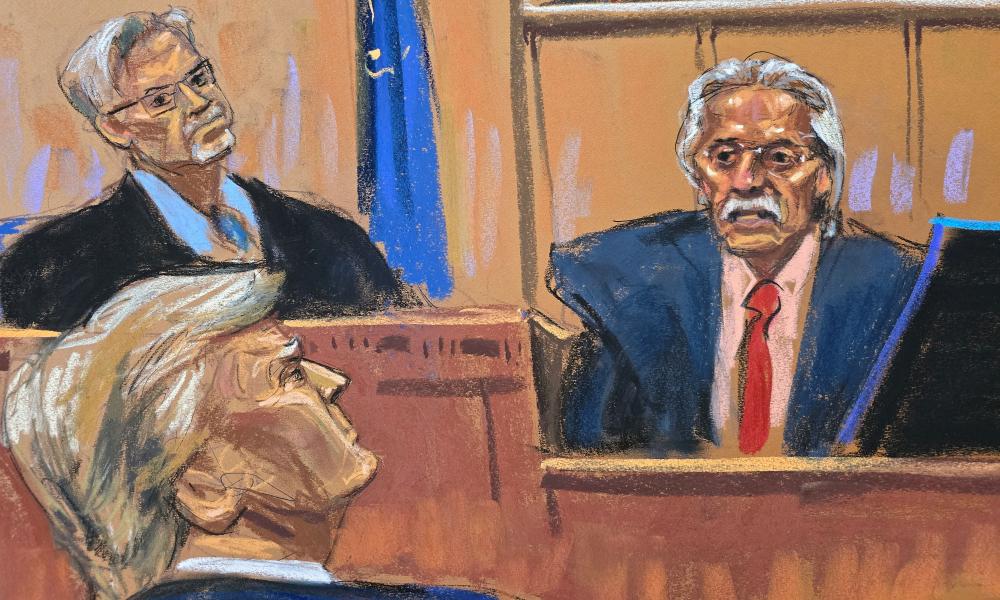On the docket: Pecker, wrapped
We’ve now finished our first week of testimony in former president Donald Trump’s criminal trial – and have one major witness in the books.
David Pecker, the former CEO of American Media Inc (AMI), and CEO and publisher of the National Enquirer, wrapped up his testimony on Friday afternoon after cross-examination by Trump’s legal team and a quick second round of questioning from the prosecution and defense.
Prosecutors had a few main goals with Pecker:
• Show that Pecker and Trump engaged in an illegal conspiracy to influence the 2016 election
• Establish AMI’s “catch-and-kill” pattern of purchasing negative stories about Trump to keep them under wraps
• Show how close the former Trump attorney Michael Cohen was with Trump
• Tee things up for future testimony about the falsified payments scheme that Trump allegedly used to pay back Cohen after he paid to keep adult film star Stormy Daniels from telling the public about her alleged affair with Trump before the 2016 election
They seemed to achieve all of them, to varying degrees.
Pecker said he had agreed to help Trump keep bad stories out of the news, saying on multiple occasions that he had promised to be the Trump campaign’s “eyes and ears” for problematic stories – a contention he repeated while being grilled by Trump’s attorney on Friday.
He said explicitly, and repeatedly, that he had been doing so to help Trump’s election chances. When asked why he’d paid $150,000 to buy the former Playboy model Karen McDougal’s story to keep it quiet, he said he and Cohen “didn’t want this story to embarrass Mr Trump or embarrass or hurt the campaign”.
He talked about specific meetings he had had with both Cohen and Trump, and made clear that Cohen had regularly checked in with him on behalf of “the boss”.
And Pecker’s testimony established a pattern of Trump looking to get others to buy women’s silence to help his campaign, setting up Trump’s post-election payments to Cohen.
How Trump’s attorneys went after Pecker
While Trump attorney Emil Bove poked holes in some specific points Pecker raised during cross-examination on Thursday and Friday, he didn’t seem to accomplish much in undercutting the credibility of Pecker’s overall testimony.
Here are some highlights from the cross-examination:
• Bove got Pecker to confirm that he’d run negative stories about Hillary Clinton long before Trump asked him to target his political opponents, and agree that it made good business sense to run those stories.
• He got Pecker to admit that he’d caught and killed stories for other celebrities.
• Bove also questioned Pecker’s memory, saying that he had listed two different time periods for when he first met with Trump about his campaign. “These things happened a long time ago. Even when you’re doing your best, and I’m sure you are, it’s hard to remember what people said almost 10 years ago,” Bove said.
• The Guardian made a cameo! Bove got Pecker to say the Enquirer often repackaged other outlets’ negative stories about Trump’s political opponents – and spent a few minutes talking about The Guardian’s reporting on Ben Carson as an example.
Some of Bove’s cross-examination seemed nitpicky – and a bit desperate. Bove, at one point, pushed hard on Pecker’s federal non-prosecution agreement, asking Pecker whether, during a meeting with the Manhattan district attorney, his lawyers had taken issue with the accuracy of the language of the agreement. Pecker pushed back, saying it had been a disagreement over verbiage, with one side saying “purchase” and the other saying “sell”.
When prosecutors got their chance to question Pecker again, they got him to say that the non-prosecution agreement was accurate – including the part where he attested the “principle purpose” of the deal between Pecker’s company and McDougal had been to prevent her account from surfacing as he ran for president. Other perks in the agreement his company had made with her, Pecker said, were “included in the contract basically as a disguise” to hide their true intent.
After Pecker wrapped for the day, prosecutors moved on to the next witnesses – a group of lesser names who are testifying to confirm specific details of others’ stories.
First up was Rhona Graff, Trump’s longtime executive assistant.
Graff said her attorneys were being paid by Trump and that she was there under subpoena. She testified that both McDougal and “Stormy” were in Trump’s email contacts, and that she had a “vague recollection” of seeing Daniels at Trump Tower at one point, though on cross-examination Trump’s attorneys got her to say she thought Daniels had been there as a possible cast member for The Apprentice. Graff said Trump was a “fair and a respectful boss”. Trump said something to her as she left the courtroom, seeming to thank her.
Next on the stand was Gary Farro, a Flagstar Bank employee who had had Cohen as a client and whose testimony was used to verify a paper trail of banking information from Cohen around the time of the 2016 election.


